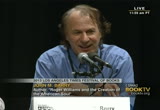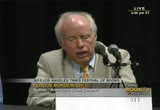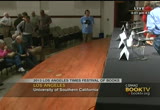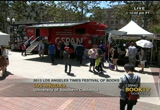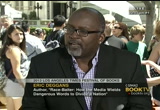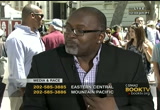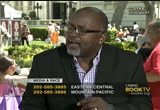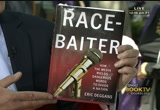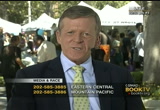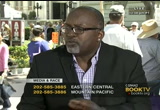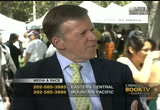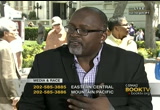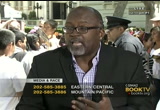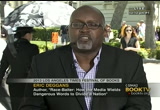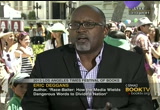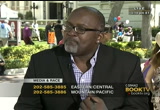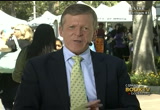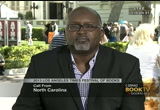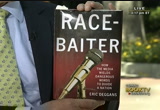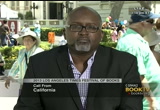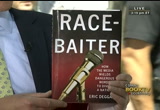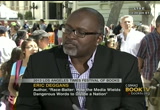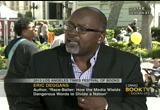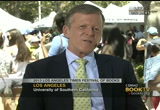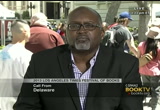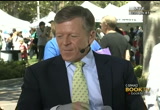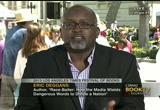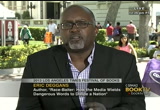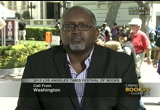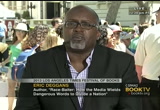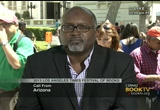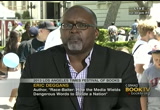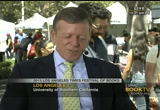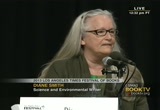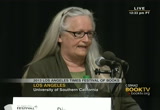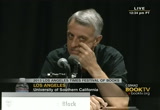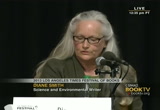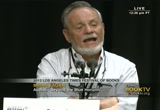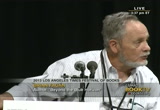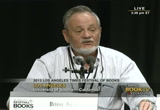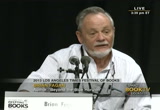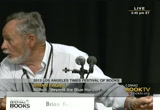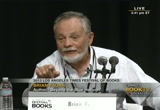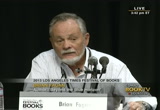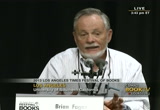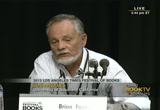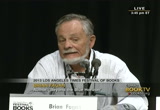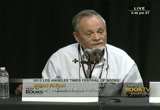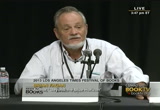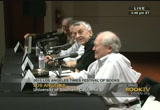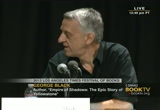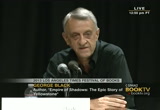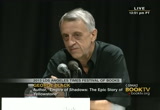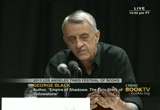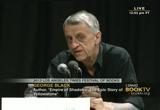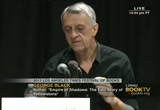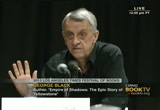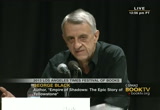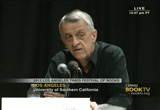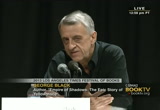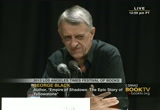tv Book TV CSPAN April 20, 2013 3:00pm-4:01pm EDT
3:00 pm
3:01 pm
government from the parchment sketch of the constitution, and you'll see people like james madison and other favorite not so favorite founding fathers, deep in the mud, slugging it out with each other over what this country is going to be. >> that brings us to a conclusion here. i want to remind you of two things. first, the signing area, number one, and you should buy these books books and have them signed. second, i'd like you to join me in thanking our panelists. [applause] [inaudible conversations]
3:02 pm
>> you're watching live coverage of book tv on c-span 2. this is "the los angeles times" festival of books. you have been watching historians aim good greenberg, hw brands and john barry in a half here here another usc, a panel on discovery, talking about yellowstone, the oceans and urban sprawl vs. wildlife. book tv is live on the campus of the university of southern california. all afternoon and tomorrow we'll be live, and we are covering author panels as well as talking with authors, and joining us now from our set here next to the c-span bus is eric deegans, and here is his book: "rate-baiter
3:03 pm
how the media wields dangerous words to divide a nation." mr. deegans, what's a race-baiter? >> good question. i'm trying to redefine the word race-baiter. i found when you try to have discussions about controversial issues, people try to shut down the discussion by calling you a race-baiter. you bring up uncomfortable conversation, trying to get some power by accusing someone else of being insensitive. my whole point is as a nation becoming much more diverse, becoming -- we're seeing a greater impact from people of color, we're going to have these conversations more and more often and we should feel free to talk about our differences in a way that's open and nonjudgmental and aimed at making progress on these issues instead of trying to pretend they don't exist. >> host: where did the name come from? >> guest: from my good friend, bill o'reilly on fox news
3:04 pm
channel. he called me a race-baiter in 2008. >> host: whoa? >> guest: i'm november sure why. he cited i am the in a group we give people on suggestions how to better cover issues involving race and prejudice. when cnn, for example, said that one of the boston bombing suspects was a dark-skinned male we reminded folks we have a whole set of guide licenses, baited on the "associated press," about when to use race, how to identify people of color, people in general when they're criminal suspects and that's the stuff we work on. we try to advance training. try to point out when people make mistakes and say, there's a better way to do this stuff. i'm not sure how that make mess a race-baiter but i imagine what bill is upset about i have been critical how he talks about race on the show. i feel like on fox news channel, especially, they reflecting the
3:05 pm
fears o tieui often, and their audience is mostly white, mostly older, mostly more conservative, obviously, and a high concern that white people are being marginalized and sidelined as people of color get more power in society. so he reflects that in what he talks about when he talks about race. sometimes that leads to not being as fair as you can be and echoing stereotypes, and i've called him out at times, and so i wrote a piece for the huffington post and for my own newman, the tampa bay times, and i talked about if bill o'reilly is calling me a race-baiter maybe i'ming too something right. i told that store to some friends and they said you should rite a book about how when you want to talk about issues of race, people dahl you a race-baiter and try to shut you down. i thought that was a good idea. so i took tenneers of writing i've done on race, prejudice,
3:06 pm
exterior types and media, and pulled it together in one book and used the unfortunate second of the race-baiter comment by bill o'reilly how to overlay it all. >> host: you write this book is an attempt to decode the way media outlets profit by segments americans. you call it the tyranny of the broadcast. what happenses a biggest pieceses of an increasingly fragmented audience are courted at the expense of many others. >> guest: yeah. there's this idea of once upon a time, we remember when there were three or four networks and people, made use made money by drying together huge audiences and then selling advertisers access to them in our modern media environment it's so fractured that people are targeting small niches. how do i get young males or middle aged women or black people, and unfortunately i think some media outlets decided to use pledge dirks stereo type,
3:07 pm
even close to racism to draw in an audience and keep the audience on their platform rather than going to others. so what i try to do in this book, i try to explore that a little bit. try toy describe why that is happening and help people diffuse these things so they can recognize it when they seive it on fox news channel, on msnby, on the drudge report, they have a sense of what is going on, and they're made more media literate and they can response in a way that makes sense. >> host: eric deegans is our guest. the book "race-baiter." the numbers are on the screen. >> host: you can also contact m-deegans by social media. our
3:08 pm
>> mr. deegans, you used the term coded language. what does that mean? >> guest: well, there's lot of ways -- because i say one of the great successes of the civil rights movement is that we have reached the point where outright racism is marginalized and demonized, rejected. so when people want to talk in these ways where their invoking prejudice or stereo types they use coded language. they say something that comes close to what they mean. so when we see someone like newt gingrich running for president and he calls president barack obama the food stamp president, on one level he can say i'm talking about how more people went on food stamps during barack obama's presidency than any other president. you can dispute that figure or not, and some people have, but that is what he says he means there but there's another meaning on top of it, where black people are associated with welfare programs. welfare programs are considered
3:09 pm
undesirable. the term welfare is determined undesirable, and if you can connect a black president with the idea the is handing free stuff to people to get them to vote for him, that's an association that can work with voters. and indeed people, journalists who interviewed folks who voted in the south carolina primary where gingrich won the republican contest, said that idea was a strong one for them. that association was something they agreed with. so, we see even now politicians can use this coded language, reach the people they want to reach, but also be able to deny they're using that tactic because there's another meaning to the words. >> host: booktv covered you at indiana university and seemed to be mostly african-american audience who when we were talking about conservative runnans suching a herman cain, ben carson, one of the questioners used the term uncle tom. is that a fair term to use when you talk about conservative
3:10 pm
republican african-americans. >> guest: i don't like that term. i can understand why some people get angry with herman keane or ben carson and other black consecutives who have become a star in conservative meet media. i think that kind of conversation is counterproductive. i have written that trying to reach into somebody's head and figure out whether they're a racist or north, an uncle tom or not, is counterproductive. you can never in the that all you can do is look at what they say, look at the impact of their words and look at the history of what they say. so what i say about herman cain is a lot of consecutive conservatives like hem because he talks about place a way they talk about race there arlet of conservatives who are verse sensitive about being accused of being racist but they have beliefs about how race works in society that other people find objectionable. so, if you are going to go and say, well, racism doesn't hold back people back anymore, or if
3:11 pm
you say that black people have been brainwashed into voting for the democratic party. herman cain said those thing, so if you're a white conservative and believe those things you can say, well, there's a black conservative who thinks these things, too. he can't bay racist. how i can be racist? i don't like using the term racist because that's too extreme. i think prejudice, bias, words are a little softer, describe terms dealing with stereo types and bias as opposed to outright racism where you're a bigot, i think we reached a point in this conversation where we have to figure out how to talk about buyees or stereo type that don't ride to outright racism,. >> host: eric deegans is our guest. he is the author of "race-baiter" and patrick in new jersey, you're the first caller.
3:12 pm
>> caller: thank you very much. mr. deegans, i think your book is pertinent and america unfortunately -- i don't know why we avoid having this conversation about race. it is a troubled part of american history, unfortunately, but we need to talk about and it instead of saying somebody is completely a racist or i have no biases at all we have to have national dialogue how to get past this and learn from each other and grow, because america is a wonderful country that can build on ideas and not be solely about one race against another or biases or troubled pasts. what are your thoughts on this? >> guest: well, i totally understand what you're talking about. i agree with you. there is too much of a hesitancety -- hesitancy to have these conversations. but people are afraid of being accused of being racist, and so -- especially white people are afraid of being accused of being racist, and one of the
3:13 pm
things i try to talk about in my book is stereotypes is productive. prejudice can be very productive. if explains the world in ways that are comforting. gives you a sense you understand people and situations before you even walk into them. you feel like you can walk interest a room and you know what everybody is about before you even talk to them. so, i understand why some stereotypes can be seductive. what we have to do is say, even people with a good heart or who are not racists or bigots can fall prey to stereotypes. so let's talk about the ideas and make sheer -- sure we're considering the full scope of the argument and understanding the person next to us, and if we can have those conversations -- that's why i don't like the term uncle tom. i feel like that term, you're automatically denigrating someone, and you're slapping a pejorative term on him. i'd rather you've say i disagree with your ideas.
3:14 pm
let's talk about it. and we can have a discussion in that space, then people will be less hesitant to have a conversation. >> host: you talk about nbc news after katrina. >> guest: sure. i was lucky enough to interview brian williams, the top anchor at nbc news, few days after katrina hit. he had made covering katrina a priority. he was there for weeks and weeks. did a lot of great work and was really passionate about trying to start a national conversation on race and poverty in america. and thin talked to him five years later and he had to admit, that national conversation didn't happen because people would rather watch entourage, and i understand his point, which is that it's an uncomfortable conversation, and media doesn't cover poverty enough. i think one of the reasons why we saw candidates like mitt romney and even people like -- other g.o.p. stalwarts say that
3:15 pm
there's 47% of the country that once they get things for free, and wants government handouts. i feel the media has not done a great job describing who the poor are. what is poverty liken your community? what are poor people like? when there are people out there who are working at wal-mart, working at mcdonalds, ups, not necessarily making enough money to make ends meet, many have two jobs, taking the bus, riding a bureaucrat. there are people who are poor who are working very hard and i feel like if we told their story better in the news media, perhaps people would understand that 47% better. >> host: marie in sugar grove, north carolina, good afternoon. you're on booktv on c-span2 with eric deegans. >> caller: high, how are you? >> host: hi. >> caller: i just want to -- can you hear me okay?
3:16 pm
>> host: yes, go ahead. >> caller: okay. i just want to convey my experience. i grew up in the greater cincinnati area, and in may of 2008, i went to dinner with some friends. i'm white. two others were white. a dear friend of ours who is african-american. and we got our meal and all of ours, the white women, all our meals were served on a plate and her was served in a to-go box, and it was just devastating, and i'm -- i was born in '55. all my friends are in that area of age, and my african-american friends have say you have to pick your battles. and i grew up in that area and i lived in the -- i'm telling you, this is just horrendous, and i have been really -- planning on getting your book and looking at the situation from your angle the and see what you have to
3:17 pm
say. thanks for taking my call. >> guest: thank you for speaking up. i know talking about these incidents can be difficult and emotional, and i feel really sorry for your friend and i'm sorry to hear what you went through. i think it's important when we see stereo types and prejudices and bias rear its ugly head in conversation that those of us who are not the subject of that prejudice speak up because sometimes that can be the most powerful action. for example, if i'm in a group and i hear someone say something awful about someone who is gay or i hear someone say something that is awful about women, i will speak up and say, i know you think i'm part of the audience for this awful joke and this awful comment but you know what? that's not part of who i am, and i don't tolerate that kind of talk around me. and i'm not suggesting that you guys didn't do everything you could in that situation, not at all. but my recommendation for people who find themselves in a circumstance is find a way to
3:18 pm
politely but firmly say our friend got a to-go box. what was the meaning of this? when they understand that the white people at the table have a problem with how the black person is being treated, they understand, wait a minute, people who are like me have a problem with this. and that's one of the best ways to sort of combat this issue. be firm, polite, but show even though you think you think i'm part of this, i'm not part of this. >> host: next call from james in sacramento, california. james, please go ahead. >> caller: yes, just want to let you know i am concerned about my president, i voted for him twice. and i'm still trying to figure out-mr. deegans, what is the situation why we cannot get our president to be more inclusive with many of the blacks in our neighborhoods. we don't get a chance to ask
3:19 pm
questions. some of the men like stockton and jesse jackson, we don't get the kind of leverage and power in our neighborhoods like we should with our president. i love him. and i want to see more of him dealing with a lot of the back issues. we did our part. >> guest: i talk about that in the book. i feel as if barack obama is in a position where, whenever he talks about race, his unfavorable ratings with white voters go up precipitously. and we saw that when henry lou guess gates, the noted professor at harvard got arrested inside
3:20 pm
his team when neighbors thought they saw burglars. he talked about it during a press conference and his unfavorable rate went up with white voters and in a sense he was pressured to find another way to talk about that issue, and of course we remember the infamous beer comment. the same thing happened when he talked about trayvon martin. he said this young teen, trayvon martin, unarmed black teen, killed in a subdivision by a neighborhood watch volunteer, he said if i had a son he would look like trayvon, and that helped ignite a conservative backlash to that situation simply because the president spoke in terms that could be related to race. i think he has quite rightly sort of intuited they're not a lot of upside to him talking about race when hi is president and there's a lot of down side for democrats and himself, and is a say in the book i cannot wait to read the book that barack obama writes about race when he gets out of the white
3:21 pm
house. >> host: is that fair to the country? >> guest: i don't know if it's fair to the country but in a weird way we're at a point where consumers and the public have more control over these situations than they realize, and if he talked about race and it was accepted by most of the people in the country, he would do it. but what hi is finding is when he talks about race, it spikes his unpopularity with white voteres. and so he has to take his shots, and frankly, i would rather see our president, whoever he is, focus on the issues he can make a difference on, and if talking about race is going to make it harder for him to make progress on the pressing issues of the day, almost feel like that might be a subject he can better address when he is out of the white house, when he has more freedom. he doesn't have to worry about public opinion, and when can really zero in on a subject in a way he can't do when he is president and has to deal with every crisis that comes across
3:22 pm
the desk. >> host: if the first black president of the united states can't talk about race, how can we have that conversation? >> guest: folks like me and my book. we found -- i mean, we looked at the surveys that talked about the gun debate, for example, and we found huge percentages of people favored background checks, but because of the political realities of the moment, it wasn't able to pass even in democratically controlled senate. so i think even though we know we need to have this conversation about race, our president may not be in a position where he can have that conversation just yet. and it won't be long before he will be out of office and we already know he is a great writer, written two books already, so i can't wait to see what he has to say when he is in bill clinton's position and he is out there speaking on his own. >> host: shane is in wilmington, delware, shane, this is booktv on c-span2. you're talking with author eric deegans. >> caller: so happy to get on c-span after seven years of trying.
3:23 pm
>> host: you're william. >> caller: yeah, seven years of trying. but the author, i have to thank you for this because i was listening to cnn when they talk about they dark skin, and i'm a retired teacher and i used to hear those comments in the faculty lounge or going through see dee segregation, they would say, oh, the city kid, and you knew exactly what meant. and fit i have to calm myself down. and then try to figure out a way to introduce the concept without them feeling attacked. but you had a previous caller that said something to the effect of, if white folks could put white folks in check, because the white folks can't hear it from black folks. something about that dynamic that just won't work. unless you have had an opportunity to build frieship, and that is so hard to do because the gulf between the cultures seems to be getting greater. but i certainly do appreciate
3:24 pm
and i basically think of writing to my local news stage this must have been 15 years ago. the observation was if someone did something who was black, you'd hear a black male. a black foe me. -- black female but they never identify any other race. i didn't hear the white guy or the white. who i would just only hear if it reflected people of color. it's such a pleasure to be on with you and i'm looking at you and saying, yay, you, and i'm going to get the book for my nieces and nephews, thank you. >> guest: thank you so muff. >> host: before you respond i want to include sharon's comment on facebook because you mentioned it and a couple caller asked viewerrers mentioned it. please give more thoughts on the current slap from the bombing photos, dark-kinked man, even when said with obviousey hesitance sis their used as striptors to give an accurate
3:25 pm
identity but are immediately followed with the disclaimer about, nothing racial or ethnic intended. >> guest: well, i call it the cable news two-step. what they do is they say, now, we're not speculating here, and then they go on and speculate. what they did with that description was, john king from cnn said, i know people will find this sensitive but i'm going to good ahead on and say this incredibly inaccurate and vague description anyway. i think there's a reason why journalists and journalism organizations -- i teach at the pointer institute offer, as i said i'm on the media monitoring committee for the national association of black journalist. there's reason why we tell nut outlets not to use this scrip tore because when we found the try identities of the suspects they weren't darked skipped. they were from an area of unthat were the caucuses mountains, and
3:26 pm
that's where caution indications came from. it encouraging racial profiling and we want descriptions to be accurate. we want people to have the accurate information they need to identify. threats in their neighborhood to help the police and to help themselves, and if you're passing along a description so vague and misleading it leads people to focus hone wrong suspects anyway, what's the point. and so it's not about hurt feelings. it's not about doing the right thing. it's not about social justice. it about being accurate, and that is one of the things that gets lost in this conversation. people think we're advocating for some kind of -- we don't deserve to have our feelings hurt, or black people don't want to have to deal with feeling badly. and it's not about that. at it about wanting accurate news coverage, about wanting a description that helps people find people instead of misleading them to focus on people who don't deserve to be profiled and missing the people who need to be seen.
3:27 pm
>> host: larry in centralia, washington, go ahead with your question or comment. >> caller: what a pleasure, mr. deegans. can you hear me? >> host: please go ahead. >> caller: going back a few years. the republican party to me has lots of racial overtones over the year, especially after the rit to vot act and all of those passed by johnson when the -- become republicans. ronald reagan opened up his presidential campaign in philadelphia, mississippi, and i wondered if the -- town happened to be where the three civil right workers were killed, three white and one black. was that a coincidence or was that a overtone to the people
3:28 pm
who seemed to connect with the dots? >> host: thank you, sir. >> guest: thank you for the question. i have not studied that particular incident so i can't tell you for sure what was going on there i do remember the press coverage at the time and there was a lot of turn about that in certain quarters. i'd like to think it was a coincidence, and i'd like to think that what reagan really was doing, though, was definitely trying to appeal to disaffected white voters in the south, who he knew would be key to his campaign as president. and a key component of that appeal has often been, since the 1964 signing of the civil rights act by a democratic president, key component has always been saying we're the party that is going to stand up for white people as opposed to being a party that grant all these rights to black people. and it's an unfortunate chapter and it's one reason why our poll
3:29 pm
particulars have used code words, because we have increasingly come to a point where they can't say such things directly, and while we have to stay vigilant because we saw in the last presidential contest there were candidates who edged close to that language even in the 21st century. >> host: pat trish sharks you're the last caller for eric deegans go ahead. >> guest: the pressure is on. >> caller: thank you for taking my call. i would like to hear you comments on race-baiting from the left, and in particular, jesse jackson. i'd like to hear what you have to say about that. thank you so much for taking my call. >> guest: there's a bit in my book about al sharpton and his dual roles as a spokesman for the family of trayvon martin and
3:30 pm
an anchor on msnbc, and i've always criticized it that and felt it was inappropriate for have someone as a major anchor on a news channel who is also representative of someone at the center of one the most covered news stories in 2012. i think there's room to criticize the way some people on the left talk about race. i do sort of feel -- i don't want to do what we call false equivalency. i don't want to look at what happens on the left and equate it to the right ununely thi has happened in the conservative media sphere is much more negative and intense and much more problematic, so i do have some trouble with in of the things on the left and i have talk about al sharpton in the book. but i do focus a lot on the conservative media sphere because there's a lot of troubling things. >> here's the cover of the book, called "race-baiter."
3:31 pm
eric deegans has been our guest. we'll cover him on a panel later today. in about an hour fromow, our next call-in opportunity will be with luis rodriguez, it's about his life in gangs. this back was national book critics circle nominee finalist, and he will be here in an hour to take your calls, tweets, and facebook comments as well. coming up next, next live panel, from the hancock foundation, room here at sc, and this is a panel on discovery. george black, his book is called "empire of shadows: the entick store of yellow stone." brian fagan writes about the oceans, and jim sterba writes about nature wars. this is book tv on c-span2. live coverage from l.a. >> historian from montana, and it was a little bit wintry when i left but it's nice to be here
3:32 pm
for this beautiful southern california day, as usual. joined here today by three writers who come to us originally from as far away as and no from as far aim detroit. away as new york on one side and santa barbara on the other side of the continent they bring us story that overlap in some interesting ways that will be fun to explore here. particularly on the idea of exploration and expanding boundaries, including the boundaries of the sea, the rockie mountains and even you're own backyard. and as we'll see there's consequences for this very human pursuit. some intended and maybe some not so much. and what i found interesting going through the biographies of these three individuals is they all three reported from all parts of the globe, working at
3:33 pm
field archaeologists, war correspondents and voices for the environment. so they bring much broader perspective to these topics than you might at first expect. so, again, thick we're in for an interesting discussion. we'll follow a pretty straightforward format. i asked each author to talk about their books, about ten minutes or so each. we'll have a chance to maybe interact as a panel and then we'll open the microphones to you in the audience to see if you have any questions of the authors. and again, afterwards, if you have lengthier ideas you would like to pursue with them, join news the signing area one. so, with that, i'll introduce you to the three writers today. we have brian fagan here, a professor emeritus of archaeology at the university of california santa bra, a ph.d from cambridge university, and
3:34 pm
as we learn in his book, "blonde the blue horizon. " he is an of vivid sail and has been ground the globe and brings those experiences to the story. george black, next over, is -- works for the national reserve defense council and has reported from five continents, his most recent book here, "empire of shadows" is about the history of yellowstone but really looks at some of what i consider the prehistory of yellowstone, and some of the antics that were going on in the area around montana, some of my state's darker history. and that significantly was a finalist for the 2012 "los angeles times" prize on history. and then we have jim sterba, who
3:35 pm
has also been a foreign correspondent, a war correspondent, and a national correspondent for more than 40 years. first in "the new york times" and now for the "wall street journal." his latest book here, "nature wars" was a finalist for the 2012 "los angeles times" book prize in current affairs, and for those who live in the suburbs alongside an influx of white tail deer and canada geese, you'll find his discussion of his work particularly intriguing. i thought today we would start with brian fagan, who has written a fascinating account of early explorations, along the ancient coastlines and across seas and oceans. in his book, you'll learn to appreciate the sea as a living entity that unites rather than divides land and people. i think that was the one thing.
3:36 pm
that's the one thing i took away from the book, it's not a separate entity but actually a uniting entity. he portrays it at a human environment, which i think is part of the attraction, and he brings his own personal experiences to that. so i think that's a good place to start, about how you came to write the book, brian, and we'll go from there. >> the villain is over there. my editor. he encouraged me. this book took a long time to jestitae. it began when i visited a former fishing port in northern denmark and there was an artist there who painted the their north sea fishermen and he had painting of a group of fisherman on shore,
3:37 pm
watching a fishing boat offshore trying to weather a point, and title of the painting was, will he make the point? but the painting itself is memorable for one thing alone, and it is the weather-beaten faces of these fishermen. the sea was literally etched into their faces. and it was then i think i realized tsailors of this sort were people apart and they had knowledge of the ocean that average people don't have. and from there this morphed into the idea of writing a book about early sea-faring, not galleons or christopher columbus or lord nelson or anything like that. that has been done to death. we have roman galleys. the guy beating the drums. what this book is bat is a very
3:38 pm
simple question. how did people look out at the horizon and pluck up the courage to go over it? when there was nothing to be seen. but i had a -- we had a lot of lunches about this, peter and i, as to what to do. how to approach it. and in the end, we came up with the idea of approaching this from my own personal perspective. i had been sailing since i was eight. i'd crossed the atlantic and i did it in the days before you press a button and you could be told where you were within 30 feet or when you learned that a mosquito was clearing his throat 20 miles away because of your gps. i dead if with dead reckoning and a compass and i scared the daylights out of miss.
3:39 pm
but it sail on a sailboat and made land fall on an island within quarter of a mile. and i learned about the ocean. the reason i tell you this is because this book isn't really about plucking up the courage to go over the horizon. it's a book about people's relationship with the ocean, and the relationship with the ocean for people who spend their lives fishing it, living on the coasts, exploiting it, is very intimate indeed, and i found a fascinating jumble of an bridge knees in australia who think of the ocean and the territory under it in exactly the same way as they think of the landscape. they're not afraid of it. they're cautious about but it's a continuum. and the same was true of the norwegian fishermen and danish
3:40 pm
fishermen. once you realize that it changes the rules because these people know the ocean in ways that we don't. many of you probably have been on a cruise ship. a cruise ship you have really no relationship to the ocean at all you. have a closer relationship to restaurants and nightclubs than you do to the ocean. but if you go on the ocean in a canoe, which may be this far off the water, you discover every nuance of the ocean, and the people who first went offshore -- believe it or not, this was 50,000 years ago in southeast asia -- had no problems going because they n knew the pattern of the winds, and one of this most interesting things about exploring the pacific is that these voyages and exploration about which individually we know nothing, were invariably done and we notice from computer modeling,
3:41 pm
with the wind ahead of you. so that you could always guarantee to come back. but there was another question which arises from this. not the sort of watercrafthow long if i got? >> a few minutes. >> stop me when you need to. >> i well. >> you've got a very interesting issue, and this is a very fundamental issue in the book. how the hell do you know where you are when there's no land? and there is an enormous, incredibly dull literature. the worst literature in the world is academic literature. the worst is postmodernistic, modern urban planning literature, all about ethnoscapes, whatever those are. or human relationships with animals, domestic animals.
3:42 pm
omg, if i may quote twitter. just unbelievably dreadful. anyhow, i bother you. but the voyaging literature was really thrown overboard when everybody was talking about accidental drifts in the '60 asks spend a yachtsman david lewis worked with a poll know, navigator who navigated from polynesia using the movements of the heavenly bodies. used the huge body of oral tradition passed from one generation to the next. about courses to different islands. and the discovery of the poll poll -- poll nearbians was because the people new the passage of the heavenly bodies
3:43 pm
and also knew how the swells felt. let me give you an example. this is straight out of the oral tradition. of you approach ansland you will get the regular ocean swell and then you get waves reflecting off the cliffs to quite a distance out, and these people, these pirates, were and still are, so in tune with this that when they started feeling it or suspecting it, they would stand up, lean over, and sense the direction in which their testicles were swinging. you laugh. but they were so in tune with the ocean and their bodies, they did it. and david louis once toll me he was out when the guy did this and the guy pointed and said, the land is over there it was, they found it a day later. so that's the sort of intimate
3:44 pm
knowledge i'm talking about. and the other thing that is very startling is how little of this is really known. for example, there's a huge literature in the illad and the odyssey, how to find coves. here's an olive tree which leans over and behind is a cave and if you do this... it's all passed from one head to the other. the other thing that is fascinating -- the one thing didn't want to do, and wouldn't let me do, was write a book on ship wrecks, or on boats. there are boat booked a infinite timum. but the most remarkable think thing about boats is they're a vehicle for communication, and one of the things i got very involved with heres was the skin tie yacks from the -- skin kayaks from the aleutian islands
3:45 pm
and they're scare the living hell out of you. they're like this, and i started paddling and i said, to quote, omg as i was paddling, expecting to go over. he said, relax. and the boat looked after me. motor boats went by with wash and i just paddled like this, and these things were built and just -- out of stellar sea lion hide, the tough hyde on the next of the stellar sea lion, and these people went all over the please in these things, open water, and there were lovely accounts of how they navigated how they would bring two kayaks together if the sea got rough and make a kind of raft. but in 1100 or 1200a.d., the sea
3:46 pm
lions which love the sea water vanished. global warming. a peered of warmer sea temperatures. the people gave up living on the coast and moved to the salmon streams. five years later the seas came back and they were back with their kayak. in the pacific northwest you have these inland passages. you go up in cruise ship and it's well worth doing. do it in a small ship. and these canoes were paddled up and down here, but some of the -- they said they'd stop and gossip. this was the facebook of the time. important way of communicating in villages which were widely separated. marriages were made.
3:47 pm
plots were done. raids took place, trading took place, and they gossipped. and you say things about gossip, and my final comment -- two comments, one is that intelligence on the ocean has always been passed from one person to the other, and only in the 17th and 18th century did they begin to set it down in formal sailing directions. and today, we go out and you see these yachts festooned with this equipment. this equipment can cost 20,000 bucks. you press a button, it will tell you where the nearest bar is, or how you-how many miles you are from a lighthouse to within feet. it can even tell you the water temperature. and we've forgotten and there's a picture at the end of the book -- of an oceanliner, and in the background you see traditional fishing boats, because it's only in the last
3:48 pm
half century that we have begun to lose 50,000 years of accumulated knowledge about the ocean, and the knowledge is our bodies, our feelings, our observations. and i always say to my fellow yachties, what happens if that machine goes wrong? and a lot of them will be lost. the ocean is terribly precious. so is our knowledge of the ocean, and ultimately that is what this book is about and i've given you just a tiny fraction of the fun stuff. full of deliciously esoteric stuff. >> a marvelous read. [applause] >> george? >> follow that? followed by telling you why i would never write other book about the ocean, i went out one time to purr suv my great love in life, which is fishing in
3:49 pm
senegal, and first of all went to find the local fishing beach, and found four muslim fishermen who agreed they would take me out in their boat the next day. so i then scoured the city of dynamic car to -- da dakar and tracked down a frenchman and dragged out a backward spinning rod. aarrived at the beach at 5:00 the next morning and these fishermen took one look at me and said, what is that? i said it's a fishing rod. they said, throw that away. so we went out in this -- to hand lines to barracuda. and we got about six miles offshore and i had never been sicner my life. we were about this much about the water level, and they're doing the usual look at the horizon thing. and i'm going to die.
3:50 pm
and they just -- they almost fell off the boat laughing no white man can do what we do. no white man understands the ocean. at least one does. what took in to the yellowstone book was that love of fishing. but to a very circuitous route. i love to fly-fish. i worked on a book on a very esoteric subject, although random house agreed to publish it, called casting a spell, and i'd become very enamarred of the craft of making bam buoy flyrod which is an intricate and wonderful craft and i became fascinated how they did it. and they got to go fishing with
3:51 pm
these beautiful objects which took them anywhere from 0 to 100 hours of craftsmanship to make and you have to mutt in basically ten years of more of sweat equity before you can make rod that is good enough for nobody buy and then you might get $600 for it. the best ones now earn three or four thousand for their rods, and i was tracing the lineage of a family of fly-rod makers from originally maine, then migrated to other parts of new england and then to new york state, and somebody one of this rodmakers said, you have to see the dean of all rodmakers who lives in twin bridges, montana. called glen bracket. and glen and i went fishing and became friends and once i win to southwestern mt. it was the natural thing to good to yellowstone, and like most people who see the place, it had this magnetic pull on me. it was extraordinary, and here i
3:52 pm
was a brit. what right did i have to write about yellowstone? and then realized in fact almost everyone i knew there who settled didn't begin life in montana or wyoming. they were first generation immigrants and i counted up the states and eye knew people from california, arkansas, illinois, michigan, new york, pennsylvania, et cetera, et cetera, and they'd all been drawn in one way or another by the same thing. and getting the germ of an idea to write about yellowstone, said the one thing that has never -- the period always bed me a lot, the period after the civil war. if any of you were at the panel earlier on history, lot of the writing was from that period. three of the four authors hat written about the period immediately before or during the civil war. and to me it was the period when the country was being re-invented, taking its modern form, the civil war was done. the union was there and the west was wide open and being rapidly
3:53 pm
settled. so i said something that had never been done before. who were the individuals that went and quote-unquote -- because it does derefer very heavy quote-unquote marks -- discovered this place. and they had indeed been drawn by the magnet of the west, the three main characters in my book, one came from upstate new york, one came from illinois via oregon and california, where his father followed the gold rush. one came from massachusetts, from harvard and yale law school. so was an odd mix. one was a politician, businessman, double dealer, self-promoter, who became the first superintendent of yellowstone national park. the sent one, whose father had followed the gold rush, was a soldier, a humble cavalry lieutenant who is also a self-taught scientist, brilliant man, phenomenal writer, who wrote the first great account of
3:54 pm
the exploration of yellow stone in 1870 that was haled at the time by the leading scientist office the day as the greates writings sip lewis and clark, and the third was the harvard and yale law school bookish hype ocon dry yack scholar, who became like men in the west, driven by fear, for a of the others he walked from independence, iowa to the montana gold rush. acted the politician and future superintendent, and like a lot of white men who settled there, he became an exterminationist. i think about the conversation in the earlier panel about the problem for historians out presentism. how you impose the moral assumptions and values of the present on the relatively
3:55 pm
distant past when assumptions were different. there was a lot of debate in the earlier panel about slavery. a lot of intelligent not necessarily unprincipled people believed deeply in the virtue of slavery. a lot of people won't out to the lest believed deeply and deobviously in the extermination of the indians. and what i found, one of the pleasures of researching a book like this, is -- was to me the combination of the extraordinary physical reality of being out in this place, and hiking and fishing and getting to know people who knew it intime latly, and if you know yellowstone, the country around the park is actually even more miraculous than the country within. people go to see old faithful and the guysers and the country side and ooh and awe but the countryside, in thes in the
3:56 pm
pierce indian trail, donated military marked the end of the unanimous wars they fled through an area called the sunlight basin on the eastern side of the park, which is the most extraordinary landscape in america. the other part of the research is to bury yourself in archives. i love that feeling goes into an archive and putting on the white gloves and getting special permission and laying out the diaries of the people who traveled the trails to the west in the 1860s. the crumbling old newspapers of that period. and what i found -- this was in the montana historical society in helena, and i had a hunch there were intersections here that explained the complextive of the quote-unquote discovery of yellowstone, and that was how so many of the trails that led there were driven and these three very driven individual i
3:57 pm
write about -- were driven by very, very conflicting and contradictory motives. extremely idealist. what they all dreamed of was to build new england society in the wilderness. they wanted to institute the schoolhouse and the church and the white picket fence and the masonic lodges and all the apparatus of the civilized world. they were also driven in many case by greed, by the kind of instant wealth that could be accrued in the gold fields, the montana gold rush followed by rapidly on the rush to california, then the colorado, and idaho and eventually montana gold rush. also crucial in financing the union army, and a lot of these people were very, very are department supporters of the union, and the gold camps were very, very dominated by secessionists. and also by common criminals, and a lot of -- i'm often
3:58 pm
reminded of the -- diane and i were tack talking about the tv series deadwood, which is exaggerated but deals with problems, which is how you establish a conception of law and order in a place where no such thing exists and you are beset by road agents and murderers and draft dodge euesm sou and the north and y're dealing with situations of absolute chaos. there were idealogues who believed you had to deal with the indian problem in a decisive way. there was no shortcut but there was another side to how people dealt with what they saw the necessity of violence. one of the interesting things about the idea of exterminationism in the late 19 -- mid-19th century in the west is that it very often proceeded from an idea of benevolence at the time. that there was this inevitable -- a body of social
3:59 pm
4:00 pm
is there a conflict between the idea of these men in this pristine wilderness and the idea of an indian population that inhabit the area who had to be dealt with before you could do serious exploring. at the same time, and we were talking about this, jim and i, before the battle began. the same thing happened with yosemite. you have to believe that this place for your putting a marker down in discovering was absolutely pristine. no one had ever lived there. it was too inaccessible. so flattering to the gills of these men that they could brave that terrifying wilderness. but it was based on the fiction. >> and that fiction in both cases is that the native americans had never lived there and in the case of yellowstone
112 Views
IN COLLECTIONS
CSPAN2 Television Archive
Television Archive  Television Archive News Search Service
Television Archive News Search Service 
Uploaded by TV Archive on

 Live Music Archive
Live Music Archive Librivox Free Audio
Librivox Free Audio Metropolitan Museum
Metropolitan Museum Cleveland Museum of Art
Cleveland Museum of Art Internet Arcade
Internet Arcade Console Living Room
Console Living Room Books to Borrow
Books to Borrow Open Library
Open Library TV News
TV News Understanding 9/11
Understanding 9/11